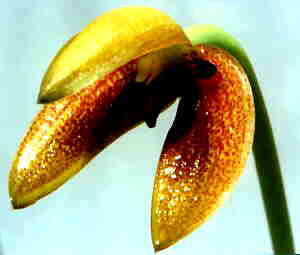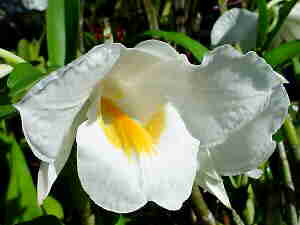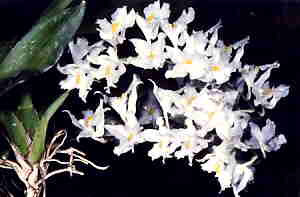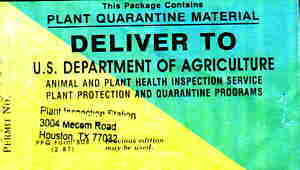NewsletterTemplate
BP SPECIES
NEWSLETTER May 2002
July
00 AugSept
Oct
NovDec
Jan 01Feb
Mar April
May June
July
Aug
Sept
Oct
Nov
Dec
Jan02
Feb
March
April
WHATS NEW ?
IMPORTANT
NOTE for USA importers. 
In FLASK.
Dendrobium formosum giganteum,
Rodriguezia venusta,Trichoglottis latisepala.
In PLANTS.
Bulbophyllum brevilabum, Aerides jarkianum,
Ready
to replate. Cattleya nobilior
"amalie", Cyrtopodium punctatum "Brazil", Angraecum sesquipedale varigata
x self,
Culture.
Bushhouse Pests.
Did you
know? IMPORTANT NOTE
USA importers, Phytosanitary Certificates, Import Permits. .
Wanted.
Do you know where these rare plants are available? Is there a species YOU
want?
Web Site.
www.speciesorchids.com New Links plus more photographs up.
Orchid Auction.
Plants, Flasks, Books.
Flasking
supplies, medias,
nonabsorb cotton wool. Notes on
flasking.
Spare Flasks
on hand. Some species that
can be shipped NOW.
Humour.
Subscribe,
Unsubscribe.
Request. click here for Flask
List Plant
List New
Germinations
Photos in this issue. Bulbophyllum
brevilabum above, Dendrobium formosum giganteum
below left, Rodriguezia venusta, below right. 
Items in this Newsletter may be reproduced provided
source acknowledged. Do you know any orchid growers who may like to receive
this newsletter? Why not forward this email to them now!
A b&w printed copy of this Newsletter can be
mailed each month if you send 12 Australian stamps or 12 International
reply coupons to Burleigh Park Orchid Nursery, 54 Hammond Way, Thuringowa,
Australia 4815.
We commend "Orchids Online
Web Design" for the excellent work on our web site.
For information or prices
click
here or email Steve at steve@orchidsonline.com........
Steve is looking for Orchid
Society and Orchid Nursery Information to include on his site.
If you can help, why not
visit his website at http://www.orchidsonline.com.au
and fill in
the online form now
New
in Flask.
Rodriguezia venusta; Photo right.The showy
Brazilian pure white flowered species does best on a slab or in a basket.
It grows under the same conditions as Oncidiums and the like, and when
in active growth will benefit from plenty of fertiliser and water.Warm
to intermediate conditions and plenty of sunlight. Dendrobium formosum giganteum. This is the very large
flowered nigrohirsute Indian species. The flowers are up to 5 inches
across. Best grown in a smallpot or basket in a well drained media, with
a drier rest during winter. An intermediate grower, it will develop into
a large plant with lots of large showy flowers that last well.
Trichoglottis latisepala. Photo left. This
is a pendulous thin stemmed species that will grow well on a slab of treefern
or with extra water, cork bark. A small welldrained basket will also suffice.
It is a clumping plant, and will produce basal sideshoots to form
a well flowered clump with bright pink purple flowers at the stem nodes.
Intermediate to warm grower from the Philippines, from where it was usually
exported under the name of Trichoglottis rosea.
Top
New
in Plants.
Bulbophyllum brevilabum, from New Guinea, produces
a single flower on a tall erect spike. The flower is pale yellow, overlaid
with red spotting. The plant requires a well drained media and a shallow
tray to spread out. Flowering size plants are growing well in a mix of
isolite and spaghnam moss in a shallow pot. Photo above.
Aerides jarkinaum. This Philippines species
produces an arching spike of waxy burgundy coloured glossy flowers that
seem to drip nectar. A smaller grower, it does best in a small basket,
moderate shade, intermediate to warm conditions. Plants are growing well
in 80mm (3 inch) baskets in a mix of shredded spaghnam and isolite, well
crocked.
Dendrobium formosum giganteum. This is the very large
flowered nigrohirsute Indian species. The flowers are up to 5 inches
across. Best grown in a smallpot or basket in a well drained media, with
a drier rest during winter. An intermediate grower, it will develop into
a large plant with lots of large showy flowers that last well.
Trichoglottis latisepala. Photo left. This
is a pendulous thin stemmed species that will grow well on a slab of treefern
or with extra water, cork bark. A small welldrained basket will also suffice.
It is a clumping plant, and will produce basal sideshoots to form
a well flowered clump with bright pink purple flowers at the stem nodes.
Intermediate to warm grower from the Philippines, from where it was usually
exported under the name of Trichoglottis rosea.
Top
New
in Plants.
Bulbophyllum brevilabum, from New Guinea, produces
a single flower on a tall erect spike. The flower is pale yellow, overlaid
with red spotting. The plant requires a well drained media and a shallow
tray to spread out. Flowering size plants are growing well in a mix of
isolite and spaghnam moss in a shallow pot. Photo above.
Aerides jarkinaum. This Philippines species
produces an arching spike of waxy burgundy coloured glossy flowers that
seem to drip nectar. A smaller grower, it does best in a small basket,
moderate shade, intermediate to warm conditions. Plants are growing well
in 80mm (3 inch) baskets in a mix of shredded spaghnam and isolite, well
crocked.
Top
Ready
to Replate.
Cattleya nobilior 'amalie"; This Brazilian
species produces large flat waxy flowers and grows best on a slab or in
a small basket. A well drained media and a somewhat drier winter is required,
with warm to intermediate conditions.
A select colour form.
Cyrtopodium punctatum "Brazil". This
seed came from a private collection in Brazil. It is a tall heavy caned
bulbous plant that produces a tall branched spike of yellow marked
red flowers. A deciduous species, it requires a dry winter, a rich media
and should be treated like the catasetums calanthes etc. In spring
lots of water and fertiliser with the appearence of the new growth. Intermediate
grower, but no problem in the cooler regions where it can be stored dry
over winter.
Angraecum sesquipedale varigata x self.
This is a selfing of a varigated leaf plant. The flowers are up to 12cm
( 5 inches) across, thick, waxy, almost like soap in appearence. Very fragrant,
it has one of the longest spurs in the orchid world. A small pot or preferably
a basket with a well drained media amd warm to intermediate conditions
is required. Perhaps a sib cross of these seedlings will produce the varigated
leaf pattern.
More photos at www.speciesorchids.com
Top
Culture.
A Fair Dinkum Aussie Tale.
G'day Ian, thanks for the April Newsletter. Great stuff.
Loved the jokes and story about the Hooded Orchids
Which reminds me of a dinky di true story you may find worthy of
including .......
.
A few years back when Woodie was still under the illusion there
were fairies in his shadehouse if you knew how to look for them.... he
did a favour for the Kalbeeba Kid and helped him get up and running on
his computer. Instead of accepting a payment Woodie took his fee in the
form of a flask of Dean Roesler's assured next Grand Champion Cymbidiums.
(Crossing names withheld to protect the innocent).
The prize was soon after deflasked into thirty spanking new pots,
each fitted with a neat white plastic name tag all hand written in his
neatest hand and numbered with a sticker. Woodie gave them pride of place
in his shadehouse and watched them grow for a week or two. One morning
he came out and found the tiny new leaves of every seedling laying down
on the pine bark, organized in a tidy formation with roots completely gone,
placed east to west atop the pot as if laid out by a tiny mortician.
'Fairies my butt,' he gasped. 'Bloody fruit rats ate 'em all!'
And so they had, as a medicine to ward off the effects of thirst from ingesting
Ratsak ( rat bait), the tell tale proof chewed up walnut shells from a
nearby tree and rat poop everywhere.
At the monthly meeting of the Cymbidium Club of SA Woodie relayed
his tale of hard luck to his mentor who said 'That was the last flask too!"
"Rats! You reckon that's a problem?" interjected Graham Morris
who before he took over the helm at the mighty Valley Orchids had his Salisbury
East back yard set up as a big shadehouse.
"While he was visiting us my son in law's Fox-bloody-Terrier heard
the neighbour's bitch whining over the fence by my shadehouse. The horny
little mongrel dug under the gate, raced through the plants and ran up
and down the fence for half an hour before I caught him. He'd knocked all
my pots off the stands, ripped the flowers to shreds and emptied the plants
onto the ground. Worse, all the names tags fell out and I didn't use number
stickers on the pots so couldn't work out what was what so had to dump
the flamin' lot mate. Rats my aunt Sallie!
Gordon Brooks a commercial grower with acreage under shadecloth
in the Southern Regions just a cork throw from the famous wine growing
belt, overheard this new tale of woe and joined in.
"Rats... dogs, that's nuthin'" He began in his broad Aussie accent.
" I got up early the other mornin' to check the sprinklers and found five
great big bloody kanga-bloody-roos in my shadehouse. They'd jumped the
fence and were having a lovely time eating the orchids. Talk about a bloody
mess, mate."
And leaving that to your imagination, I report Woodie went home
cheered up considering himself self flamin' lucky, and switched brands
of rat bait. DrCym.
More photos at www.speciesorchids.com
Top
Did
you know ?
IMPORTANT NOTE for USA importers.
USDA has, from January 2002, begun to enforce the requirement for
a Phytosanitary Certificate for all plant and plant material imports.
This is not a new regulation, but the implementation of a rule that has
previously not been enforced.
ALL FLASKS imported into USA will now require a Phytosanitary
Certificate.
Burleigh Park does provide this Phytosanitary Certificate at cost.
Flasks are still CITES exempt.
USA growers can obtain an Import Permit and green/yellow
stickers which expedites the delivery of parcels of flasks,
plants etc. Contact and enquire for the nearest Inspection Unit U.S. Department of Agriculture, APHIS
Plant Protection and Quarantine Permit Unit
4700 River Road, Unit 136
Riverdale, Maryland 20737-1236
The Import Permit application is PPQ Form 587
Heightened enforcement of
existing regulations
affects orchid flask imports
An external audit of enforcement procedures by USDA/APHIS (US Department
of Agriculture/Animal and Plant Health Inspection Service) has resulted
in the edict that orchid plants in flask also require phytosanitary certification.
I inquired about the background on this and got the following reply from
Bud Petit de Mange of USDA:
"The way the regulation 319.37 is written, a phytosanitary certificate
is required for all restricted articles. By the definition, seedlings and
plantlets in flasks are restricted articles and, therefore, phytosanitary
certificates are an import requirement for them. A regulation change is
needed in order to exempt a restricted article from phytosanitary certification.
A little more than two weeks ago, I made a request to our agency's Import
and Interstate Services branch and asked that they propose such a change.
They are currently developing a work plan for a proposed revision to 319.37
and stated that they will include a proposal to exempt from phytosanitary
certification plant materials of generally admissible species if they are
imported on agar and/or liquid media within sterile containers (=flasks).
In that same proposal, they will propose changes regarding the current
requirement for translucent, transparent media. Unfortunately, making changes
to Federal regulations is a long, time-consuming process. Many take one
and one-half years, or more, from the time they are first proposed until
they published as Final Rules, which officially incorporates the change
into the regulation.
Bud Petit de Mange
CITES and Plant Inspection Station Coordinator
Port Operations "
In other words, sterile flasks of orchid seedlings or meristems
now require a phytosanitary certificate from the country of origin. Unfortunately,
because this enforcement change was the result of an external audit, no
leeway exists as with the recent opaque media imbroglio. However, as
these two regulation changes march through the process,
both will require your encouragement. We suggest you write to:
Dr. Richard L. Dunkle
USDA, APHIS, PPQ
Jamie Whitten Building
14th and Independence Ave., S.W.
Room 301-E
Washington, DC 20250
(Thanks to Nick for onforwarding the above.)
Phytosanitary Certificate requirements for all countries.
We are preparing a data base for the import requirements for Phytosanitary
Certificates for as many countries as possible.
If you have permits or other information, please contact us so
that we can include as many countries as possible. A snailmail photo copy
would be ideal.
The data base will list the various requirements to import flasks
and orchid plants into each country and any special requirements pertaining
to Phytosanitary Certificates.
We all dislike red tape, but the Certificates and Permits
mean disease and pest free imports and quicker delivery to you.
Do you set seed pods on your
treasured species orchids? The best conservation, sow seed.
Top
Web
site.
More Photographs Up
Check out our web
page www.speciesorchids.com
Year
2000 winner of "Linda the Orchid Lady" award .
EMAIL address
Top
Auction.
ORCHID AUCTION ACTION
Have a look at this busy Orchid Auction site.
PLANTS BOOKS FLASKS
Sell those spare plants ! Find that elusive
rare plant or book !
Orchid
Auction Site
Top
....
Wanted.
Vanilla phalaenopsis, flasks or plants.
Ascocentrum hendersonianum flasks
Paraphalaenopsis denevii flasks
If you would like to list a species that
you cannot find, click Species
wanted
and send the name and it will be listed here
in the next Newsletter.
.....
Flask
supplies.
Flasking medias; click
on here and go to Supplies page
www.speciesorchids.com
For working Nursery Medias for Mother and Replate Flasks.
A special note on flasking
orchids.
Due to the need for a filtered air vent on flasks to allow
exchange of gasses, a reliable air filter medium is needed.
Non absorbant cotton wool allows gas exchange but does not
absorb moisture. Thus the air filter will stay dry and prevent the growth
of fungus thru the filter, a common problem with ordinary cotton wool which
gets wet, goes mouldy and allows the mould to grow thru the filter to contaminate
the flask.
Non Absorbant Cottonwool NOW AVAILABLE in
375 gram rolls,
click contact
us NOW.
...
Top
Spare
Flasks on hand.
There are sometimes spare flasks available. These are ready
to ship, but we do not recommned shipping these flasks in your winter
as they are ready to deflask now.
For a list of available flasks, email
or click
here
..
Top
Humour.
A group of rowdy soccer fans is on a train on the way to the big match.
In the same carriage is an elderly man wearing his teams colours. Opposite
is a young man wearing the oppositions colours, holding a duck.
U.S. Department of Agriculture, APHIS
Plant Protection and Quarantine Permit Unit
4700 River Road, Unit 136
Riverdale, Maryland 20737-1236
The Import Permit application is PPQ Form 587
Heightened enforcement of
existing regulations
affects orchid flask imports
An external audit of enforcement procedures by USDA/APHIS (US Department
of Agriculture/Animal and Plant Health Inspection Service) has resulted
in the edict that orchid plants in flask also require phytosanitary certification.
I inquired about the background on this and got the following reply from
Bud Petit de Mange of USDA:
"The way the regulation 319.37 is written, a phytosanitary certificate
is required for all restricted articles. By the definition, seedlings and
plantlets in flasks are restricted articles and, therefore, phytosanitary
certificates are an import requirement for them. A regulation change is
needed in order to exempt a restricted article from phytosanitary certification.
A little more than two weeks ago, I made a request to our agency's Import
and Interstate Services branch and asked that they propose such a change.
They are currently developing a work plan for a proposed revision to 319.37
and stated that they will include a proposal to exempt from phytosanitary
certification plant materials of generally admissible species if they are
imported on agar and/or liquid media within sterile containers (=flasks).
In that same proposal, they will propose changes regarding the current
requirement for translucent, transparent media. Unfortunately, making changes
to Federal regulations is a long, time-consuming process. Many take one
and one-half years, or more, from the time they are first proposed until
they published as Final Rules, which officially incorporates the change
into the regulation.
Bud Petit de Mange
CITES and Plant Inspection Station Coordinator
Port Operations "
In other words, sterile flasks of orchid seedlings or meristems
now require a phytosanitary certificate from the country of origin. Unfortunately,
because this enforcement change was the result of an external audit, no
leeway exists as with the recent opaque media imbroglio. However, as
these two regulation changes march through the process,
both will require your encouragement. We suggest you write to:
Dr. Richard L. Dunkle
USDA, APHIS, PPQ
Jamie Whitten Building
14th and Independence Ave., S.W.
Room 301-E
Washington, DC 20250
(Thanks to Nick for onforwarding the above.)
Phytosanitary Certificate requirements for all countries.
We are preparing a data base for the import requirements for Phytosanitary
Certificates for as many countries as possible.
If you have permits or other information, please contact us so
that we can include as many countries as possible. A snailmail photo copy
would be ideal.
The data base will list the various requirements to import flasks
and orchid plants into each country and any special requirements pertaining
to Phytosanitary Certificates.
We all dislike red tape, but the Certificates and Permits
mean disease and pest free imports and quicker delivery to you.
Do you set seed pods on your
treasured species orchids? The best conservation, sow seed.
Top
Web
site.
More Photographs Up
Check out our web
page www.speciesorchids.com
Year
2000 winner of "Linda the Orchid Lady" award .
EMAIL address
Top
Auction.
ORCHID AUCTION ACTION
Have a look at this busy Orchid Auction site.
PLANTS BOOKS FLASKS
Sell those spare plants ! Find that elusive
rare plant or book !
Orchid
Auction Site
Top
....
Wanted.
Vanilla phalaenopsis, flasks or plants.
Ascocentrum hendersonianum flasks
Paraphalaenopsis denevii flasks
If you would like to list a species that
you cannot find, click Species
wanted
and send the name and it will be listed here
in the next Newsletter.
.....
Flask
supplies.
Flasking medias; click
on here and go to Supplies page
www.speciesorchids.com
For working Nursery Medias for Mother and Replate Flasks.
A special note on flasking
orchids.
Due to the need for a filtered air vent on flasks to allow
exchange of gasses, a reliable air filter medium is needed.
Non absorbant cotton wool allows gas exchange but does not
absorb moisture. Thus the air filter will stay dry and prevent the growth
of fungus thru the filter, a common problem with ordinary cotton wool which
gets wet, goes mouldy and allows the mould to grow thru the filter to contaminate
the flask.
Non Absorbant Cottonwool NOW AVAILABLE in
375 gram rolls,
click contact
us NOW.
...
Top
Spare
Flasks on hand.
There are sometimes spare flasks available. These are ready
to ship, but we do not recommned shipping these flasks in your winter
as they are ready to deflask now.
For a list of available flasks, email
or click
here
..
Top
Humour.
A group of rowdy soccer fans is on a train on the way to the big match.
In the same carriage is an elderly man wearing his teams colours. Opposite
is a young man wearing the oppositions colours, holding a duck.
They look at each other, and the old man says,
" You know you cannot take a pig into the grounds."
The young man answers, " You silly old fool,
this is not a pig, its a duck."
The old man quietly said, "Young man, I was talking to the duck."
Two engineers met in the park.
One said to the other, "Thats a great new bike you have there".
"Yeah", said the other " it was a most unusal gift. I met this georgous
girl who took me back top her flat, she took all her clothes off
and said "I'm all yours, take whatever you want", so I took her new bike."
"Wise choice" said the other " her clothes would not have
suited you."
Top
Subscribe.
To have your name added
or removed from the mailing list, email click
here
"Unsubscribe me please!" orclick
here
Ian and Pat Walters,
Burleigh Park Orchid Nursery
54 Hammond Way, Thuringowa,
Australia 4815
Email us at www.speciesorchids.com
Phone Fax 0747 740 008
International 61 747 740 008
For Web Design and Web Hosting
Contact Orchids Online Web Design
Designed by Orchids
Online Web Design © All rights reserved.
|




